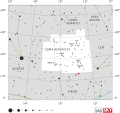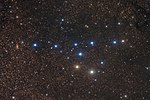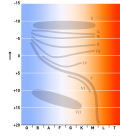Gamma Lyrae, Latinised from γ Lyrae, and formally named Sulafat /ˈsuːləfæt/, is the second-brightest star in the northern constellation of Lyra. With...
13 KB (1,096 words) - 18:52, 26 October 2024
asterism consisting of this star, Delta² Lyrae, Gamma Lyrae and Iota Lyrae. Consequently, the Chinese name for Beta Lyrae itself is 漸台二 (Jiāntāièr, English:...
29 KB (2,654 words) - 19:03, 1 January 2025
Sigma Puppis Binary star system 3.25 Eta Serpentis Star 3.250 Gamma Lyrae Star 3.26 3.22 Gamma Hydri Star 3.26 3.25 Theta Ophiuchi Triple star system 3.27...
37 KB (1,546 words) - 21:08, 17 March 2024
Epsilon Lyrae (ε Lyr, ε Lyrae), also known as the Double Double, is a multiple star system of at least five stars approximately 162 light-years away in...
13 KB (747 words) - 00:53, 4 February 2024
أُظْفُور Eta Lyrae Alawaid al-ʽAwāʼidh the Protecting Mother Camels; the Old Camels; "the Four" الربع, العوائذ الْرُّبَع, الْعَوَائِذ Gamma Draconis, Xi...
35 KB (572 words) - 11:17, 21 October 2024
distance to the Galactic Center as established from variable stars (e.g. RR Lyrae variables) or standard candles (e.g. red-clump stars) is hindered by numerous...
48 KB (4,922 words) - 23:59, 17 September 2024
Asteroseismology (section RR Lyrae variables)
many of the longest-known variable stars, including the Cepheid and RR Lyrae variables. In stars with surface convection zones, turbulent fluids motions...
18 KB (2,289 words) - 11:46, 4 September 2024
The superficially normal B and A stars alpha Draconis, tau Herculis, gamma Lyrae, and HR 7926", Astronomy and Astrophysics, 371 (3): 1078–1083, Bibcode:2001A&A...
13 KB (938 words) - 21:51, 24 December 2024
Gamma Phoenicis is a star system in the constellation Phoenix, located around 71.63 parsecs (233.6 ly) distant. γ Phoenicis is a spectroscopic binary...
8 KB (682 words) - 22:03, 26 July 2024
Gamma Doradus variables are variable stars which display variations in luminosity due to non-radial pulsations of their surface. The stars are typically...
22 KB (1,494 words) - 22:42, 17 July 2024
Coma Berenices (section Gamma-ray bursts)
a Mira variable with a maximum magnitude of almost 7. There are 123 RR Lyrae variables in the constellation, with many in the M53 cluster. One of these...
63 KB (6,958 words) - 17:04, 8 November 2024
Milky Way (section Gamma rays and x-rays)
out from the main stellar disk, with the velocity dispersion of the RR Lyrae stars found to be higher and consistent with halo membership. Another 2018...
217 KB (21,689 words) - 18:54, 6 January 2025
causes the system to vary by 0.03 magnitudes. Serpens Caput contains many RR Lyrae variables, although most are too faint to be seen without professional photography...
119 KB (11,804 words) - 17:42, 6 November 2024
of the star Alderamin (Alpha Cephei), and in 12,000 years, Vega (Alpha Lyrae) will become the "North Star", though it will be about six degrees from...
10 KB (1,159 words) - 22:01, 25 September 2024
Summer Triangle of Deneb, Altair, and Vega – α Cygni, α Aquilae, and α Lyrae – is prominent in the northern hemisphere summer skies, as its three stars...
29 KB (3,204 words) - 08:04, 4 November 2024
the star's absorption of an accretion disc. Tau Canis Majoris is a Beta Lyrae-type eclipsing multiple star system that varies from magnitude 4.32 to 4...
60 KB (6,873 words) - 16:35, 14 November 2024
Variable star (section RR Lyrae variables)
stars were known. John Goodricke himself discovered Delta Cephei and Beta Lyrae. Since 1850, the number of known variable stars has increased rapidly, especially...
51 KB (6,578 words) - 02:05, 8 November 2024
1700 BC until just after 300 AD, Kochab (Beta Ursae Minoris) and Pherkad (Gamma Ursae Minoris) were twin northern pole stars, though neither was as close...
27 KB (2,551 words) - 10:42, 3 January 2025
Pulsating Cepheids and cepheid-like Cepheid variable Type II Cepheids RR Lyrae variable Delta Scuti variable SX Phoenicis variable Blue-white with early...
43 KB (3,397 words) - 22:56, 20 October 2024
angularly found about midway between Albireo (Beta (β) Cygni) and Sulafat (Gamma (γ) Lyrae). In a good night sky it is tricky to find with large (50–80 mm) binoculars...
10 KB (935 words) - 23:32, 16 July 2024
contact with each other (overcontact binary) and are classed as a Beta Lyrae variable as their light varies from Earth as they eclipse each other. The...
44 KB (4,771 words) - 23:47, 16 July 2024
cluster NGC 1466 is an outlying component of the galaxy, and contains many RR Lyrae-type variable stars. It has a magnitude of 11.59 and is thought to be over...
29 KB (3,095 words) - 23:54, 29 December 2024
the Sun's, on average, 1.5 M☉. BL Boötis type stars are a subtype of RR Lyrae variables. T Boötis was a nova observed in April 1860 at a magnitude of...
73 KB (8,387 words) - 15:54, 28 November 2024
asterism. The nebula lies about 40% of the distance from Beta (β) to Gamma (γ) Lyrae, making it an easy target for amateur astronomers to find. The nebula...
16 KB (1,565 words) - 23:53, 2 December 2024
other around four times as luminous. The system is classified as a Beta Lyrae variable, the apparent magnitude varying from 8.83 to 9.72 over 0.66 days...
35 KB (3,974 words) - 21:29, 14 December 2024
variable stars. M62 is a globular cluster rich in variable stars such as RR Lyrae variables and has two generations of stars with different element abundances...
48 KB (4,381 words) - 00:14, 2 January 2025
luminosities of giants there are several classes of pulsating variable stars: RR Lyrae variables, pulsating horizontal-branch class A (sometimes F) stars with...
17 KB (2,352 words) - 04:39, 22 September 2024
light-years from Earth, Delta Pictoris is an eclipsing binary of the Beta Lyrae type. Composed of two blue stars of spectral types B3III and O9V, the system...
39 KB (3,844 words) - 12:53, 2 January 2025
forms – contains high number of variable stars (89) many of which are RR Lyrae stars. 2.2 billion years (11.6 Gya): Globular Cluster NGC 6752, third-brightest...
36 KB (4,937 words) - 22:37, 10 January 2025



























